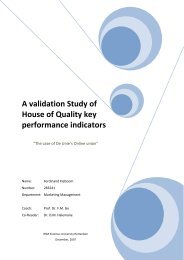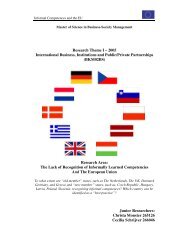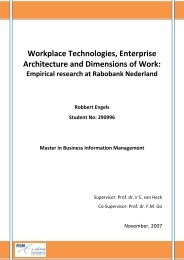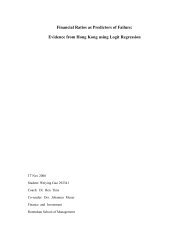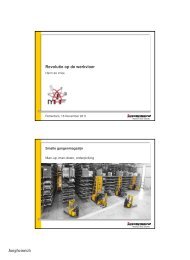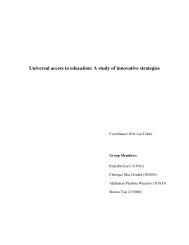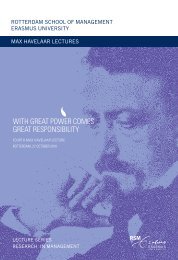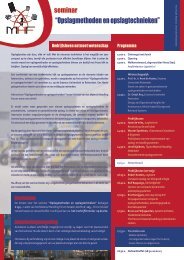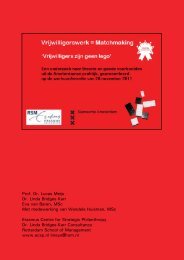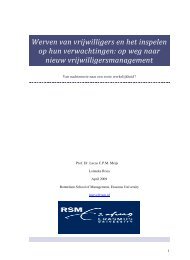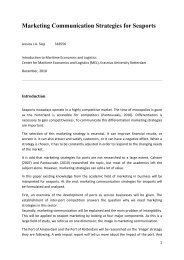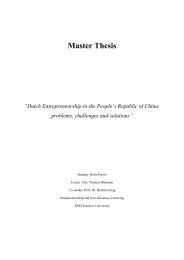ERIM PhD Reference Guide
ERIM PhD Reference Guide
ERIM PhD Reference Guide
Create successful ePaper yourself
Turn your PDF publications into a flip-book with our unique Google optimized e-Paper software.
2.4 Second and Third Year<br />
The second and third year are used for:<br />
Taking courses (only second year; not relevant for <strong>PhD</strong>s with <strong>ERIM</strong> research<br />
master background)<br />
Literature review<br />
Writing papers<br />
Presenting papers at conferences<br />
Performing the empirical part of the research<br />
<strong>PhD</strong> candidates are encouraged to participate in conferences to meet and learn from<br />
other researchers and to present their own work. To find out which conferences are<br />
suitable for your research interests, ask your supervisor or daily supervisor. They<br />
frequently receive invitations for conferences and can easily keep you informed<br />
about interesting opportunities. (For funding of your travel plans, see section 4.1 and<br />
the <strong>ERIM</strong> Support Programme 10 in annex A.3).<br />
Another important milestone in your <strong>PhD</strong> trajectory is the 2,5 year meeting. For MSc<br />
degree holders with a four‐year contract, this meeting takes place 28 months after<br />
the <strong>PhD</strong> appointment date. For <strong>ERIM</strong> Research master graduates, it takes place 22<br />
months after appointment as a <strong>PhD</strong> candidate.<br />
Before this meeting, a <strong>PhD</strong> candidate must submit a progress report of about two<br />
pages to <strong>ERIM</strong>. The progress report should inform the Director of Doctoral Education<br />
about the first stage of your <strong>PhD</strong> track, including a description of chapters or working<br />
papers you are working on (or have completed), your field work, the data you have<br />
collected, and the conferences at which you have presented. The report should also<br />
present a detailed research plan and schedule for completion of your <strong>PhD</strong> thesis. The<br />
progress report provides important information for an evaluation meeting with the<br />
Director of Doctoral Education and your supervisor in the first half of your third year.<br />
2.5 Fourth Year<br />
In the fourth year, the research is completed and the thesis is written. Once the<br />
thesis has been completed, the defence of the thesis will not take place until<br />
approximately six months later. All regulations concerning your <strong>PhD</strong> defence can be<br />
found in the doctoral regulations of the Erasmus University (‘promotiereglement’).<br />
See http://www.eur.nl/english/information_for/doctorate_students/.<br />
<strong>ERIM</strong> has its own <strong>PhD</strong> series. Dissertations can be published in printed and electronic<br />
format. All published <strong>PhD</strong> dissertations in the <strong>ERIM</strong> <strong>PhD</strong> Series can be found at<br />
http://repub.eur.nl/res/org/1. If published in this series, <strong>ERIM</strong> will pay for the design<br />
and printing (see EPS manual of the year of graduation). For further information<br />
please contact the <strong>PhD</strong> Series Coordinator and/or Doctoral Programme Manager.<br />
The first thing to do is to file a request for the <strong>PhD</strong> defence (‘verzoek tot promotie’).<br />
This request should contain the subject of the thesis and name(s) of the<br />
2 Overview of the programme 15




